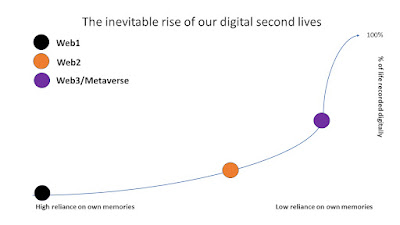The situation: Employees have been taken for granted
for too long. Rampant and widening pay inequality between those at the top and
those in the ranks is just one measure of an unequal world spiralling out of
balance. CEO compensation rose 1,322% between 1978 and 2020. Typical worker pay?
18% (Source: The Economic Policy Institute (EPI). The pandemic – and
the resulting Great
Resignation - coupled with the rapidly emerging business paradigm of HFS
OneEcosystem, is creating a perfect storm ready to sweep talent and
partnerships away from those who focus only on shareholder value and towards
those prepared to align themselves with a wider group of stakeholder needs;
employees, partners, society, and our planet, among them.
Employees have become mercenary – moving from gig to gig for
money and perks. The only weapon leaders have to resist with is more money and more
perks. That’s a sticking plaster of a solution that lasts only until the next
better offer. It does not resolve the
worst attrition rates many have seen in our lifetimes – and it never will while
you make the cost to change so low.
Stand for
something to believe in to earn loyalty beyond the paycheck
To prove worthy of loyalty beyond the paycheck, you must set
out a purpose that partners and employees can believe in. Fail to deliver on
that purpose and your rivals will scoop up your best talent with nothing more
than a bag of gold and flexible working.
Nine in 10 leaders realize the need to reposition their
organization to unleash people in the post-Covid world (with 50% boosting
talent development spend, and 48% retraining managers and leaders (source, HFS
Research, 2021, sample 400 Global 2000 enterprises). Just as critical is the
realization that in OneEcosystem,
the impact we make reaches way beyond the boundaries of our own organization.
In 2021 HFS Research found that among 158 C-level executives in Global 2000
enterprises, 9 out of 10 predicted ecosystems would be even more critical in
the post-COVID-19 world.
Establishing a purpose will prove the difference between
success and failure in the emerging HFS OneEcosystem.
Here success relies on businesses building long-term relationships of trust and
mutual benefit in networks of stakeholders.
Purpose
attracts customers and builds stakeholder networks of trust
Purpose is just as important in attracting and retaining
customers. Accenture found 62% of consumers want companies to take a stand on
issues that they are passionate about, (Source: Accenture).
Fortune found 64% of consumers say a company’s primary
purpose should be to make the world a better place (Fortune,
2019). Not only does doing the right thing attract consumers, employees,
and partners, it also convinces them to put their money where their hearts are.
US consumers are more likely to be loyal (83%) to brands that lead with
purpose. And 72% say they feel it is more important than ever to buy from
companies that reflect their values. (Cone/Porter Novelli
2019)
Grow talent
pools, and your market – by standing up to tackle inequality
Purpose isn't a mission statement on a wall, it is lived
through actions. You must act now to demonstrate what matters to you. Because
the pandemic has exposed the deepening ravine between rich and poor, taking
action to tackle inequality has become a prime purpose target with which to attract
employees, customers, and partners.
Of course, stakeholders want more than just your alignment with them on inequality. Sustainability, inclusion, diversity, and
philanthropy all matter just as much. So think of this as a start. And since
Inequality limits access to education and therefore the size of the talent pool
you can draw on – as well as constraining market size, it would seem a worthy
win-win place from which to start.
Brutal
inequality got worse during the pandemic
The pandemic has thrown the reality of brutal inequality into
sharp relief. During the first two years of the pandemic, Charity Oxfam found
(January 2022) that the world’s ten richest men (note, all men) more than
doubled their nest eggs from $700 billion to $1.5 trillion. Between them, they
have six times more than the poorest 3.1 billion people have between them (the
global population is currently estimated at 7.9 billion).
In 2020, CEOs of the top 350 firms in the U.S. made $24.2
million, on average. They earn a ratio of 351:1 versus a typical worker. In
1965 that figure was 20:1. This isn’t just a problem of Jeff and Elon’s making.
You get to own it, too.
Crazy, and
rising pay gaps are not the only route to success
Does it have to be this way to build a successful company? U.S.
credit card processing services company Gravity Payments shows there is another
path. It raised the company minimum salary to $70k for all 120 employees in
2015 – including the CEO. It has almost doubled in size since, with 90%
employee retention.
And when revenues fell 50% almost overnight in the early
part of the Covid crisis, staff volunteered to take a pay cut to keep the
business afloat. By July 2020 the company was back on an even keel. And boss
Dan Price paid back everyone who had sacrificed part of their pay in the
interim.
Inequality kills
someone every four seconds – and locks out millions more from opportunity, and out
of our demand-ravaged talent pools
Disposable income (or its obvious lack) makes a real difference
when facing the ravages of inflation. UK average energy bills are going up 54%
(BBC, February 3, 2022), food bills are soaring more than 10% (so far). Now food
banks are an alarmingly normalized part of day-to-day life for many with 700,000
families using them in 2020 alone (source,
The
Trussell Trust).
Globally the impact of inequality is real, and it is harsh –
particularly among the poorest 3.1 billion. Oxfam says (in its report,
Inequality
Kills) that while a new billionaire was created every 26 hours since the
start of the pandemic, one person every four seconds dies as a result of
inequality – lack of access to healthcare, hunger, gender-based violence, and
climate breakdown. Many millions more are shut out of opportunities – limiting
the talent pool just as the world’s economic recovery faces growth-crippling
skills shortages.
Bottom Line:
Start to set things right with measures and rewards that prove you care, to reap
the benefit of the networks of trust your purpose attracts
Leaders must now make a stand, demonstrating what they and
their company stand for, through their actions and through how their performance
is both measured and rewarded.
We have to stop rewarding pure bottom-line outcomes as if
they come guilt-free. Instead identify measures that better reflect our
business’s role in creating a safe and just space for humanity. In doing so you
will show the world the purpose you prioritize, attracting those customers,
employees, and partners who will form the networks of trust your success in HFS
OneEcosystem depends on.
Start with what you can control. To reduce basic wealth inequality
within your organization take a lead from the UN
Sustainable Development Goals. These suggest that by 2030 income growth of
the bottom 40% of the population should be at a higher rate than the ‘national’
average. Substitute ‘company’ for national and make a start today.


